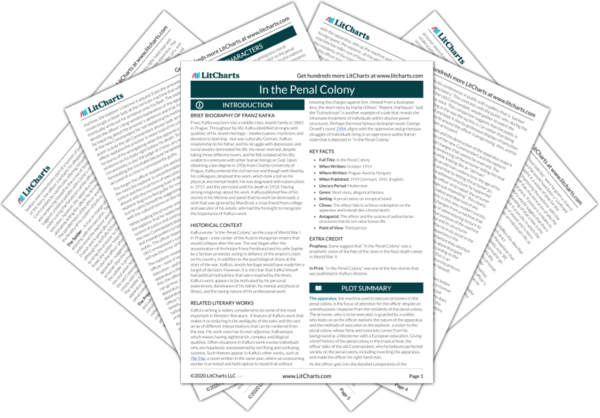The Prisoner Quotes in In the Penal Colony
“For I was the former Commandant's assistant in all-penal matters and know more about the apparatus than anyone. My guiding principle is this: Guilt is never to be doubted. Other courts cannot follow that principle, for they consist of several opinions and have higher courts to scrutinize them.”
“Enlightenment comes to the most dull-witted. It begins around the eyes. From there it radiates. A moment that might tempt one to get under the Harrow oneself. Nothing more happens than that the man begins to understand the inscription, he purses his mouth as if he were listening. You have seen how difficult it is to decipher the script with one's eyes; but our man deciphers it with his wounds.”
You are a foreigner, mind your own business. He could make no answer to that, unless he were to add that he was amazed at himself in this connection, for he traveled only as an observer, with no intention at all of altering other people's methods of administering justice. Yet here he found himself strongly tempted. The injustice of the procedure and the inhumanity of the execution were undeniable.
The condemned man especially seemed struck with the notion that some great change was impending. What had happened to him was now going to happen to the officer. Perhaps even to the very end. Apparently the foreign explorer had given the order for it. So this was revenge. Although he himself had not suffered to the end, he was to be revenged to the end. A broad, silent grin now appeared on his face and stayed there all the rest of the time.

The Prisoner Quotes in In the Penal Colony
“For I was the former Commandant's assistant in all-penal matters and know more about the apparatus than anyone. My guiding principle is this: Guilt is never to be doubted. Other courts cannot follow that principle, for they consist of several opinions and have higher courts to scrutinize them.”
“Enlightenment comes to the most dull-witted. It begins around the eyes. From there it radiates. A moment that might tempt one to get under the Harrow oneself. Nothing more happens than that the man begins to understand the inscription, he purses his mouth as if he were listening. You have seen how difficult it is to decipher the script with one's eyes; but our man deciphers it with his wounds.”
You are a foreigner, mind your own business. He could make no answer to that, unless he were to add that he was amazed at himself in this connection, for he traveled only as an observer, with no intention at all of altering other people's methods of administering justice. Yet here he found himself strongly tempted. The injustice of the procedure and the inhumanity of the execution were undeniable.
The condemned man especially seemed struck with the notion that some great change was impending. What had happened to him was now going to happen to the officer. Perhaps even to the very end. Apparently the foreign explorer had given the order for it. So this was revenge. Although he himself had not suffered to the end, he was to be revenged to the end. A broad, silent grin now appeared on his face and stayed there all the rest of the time.











